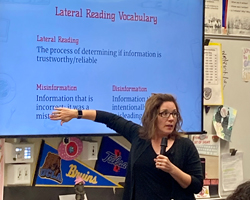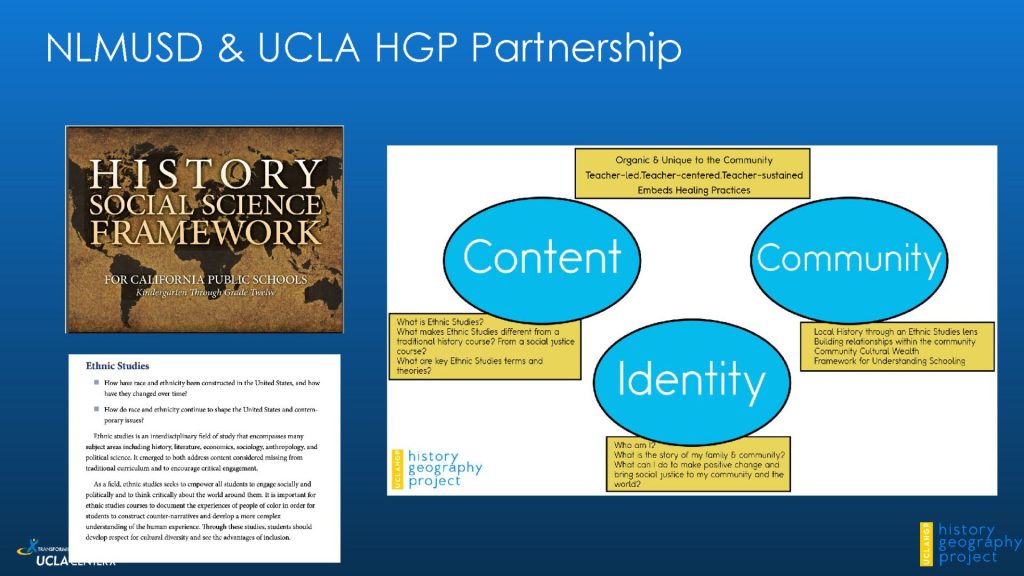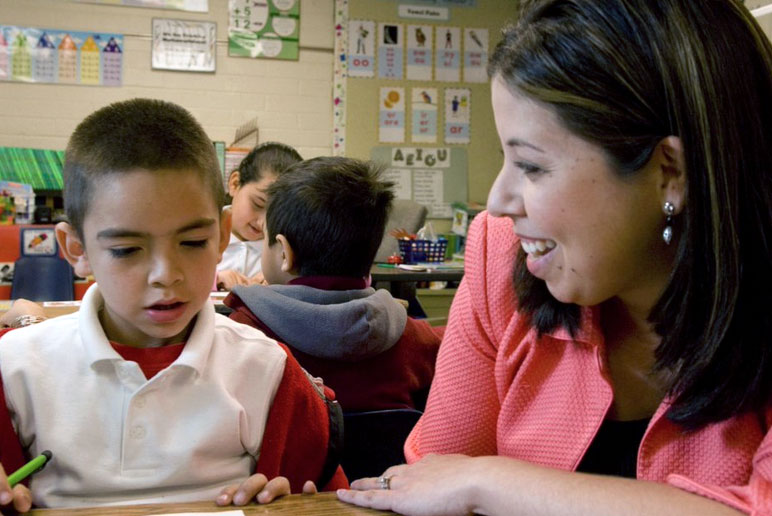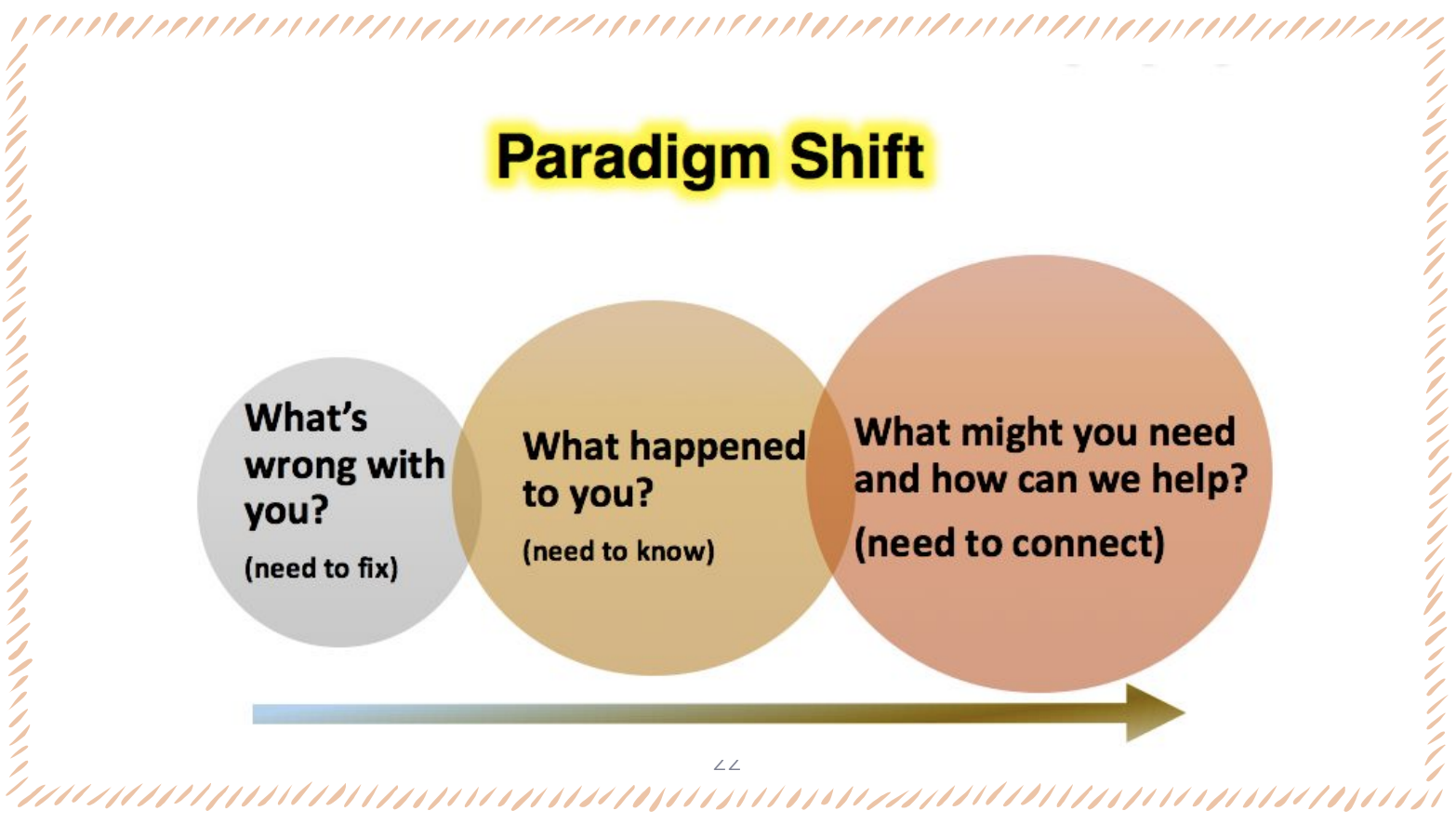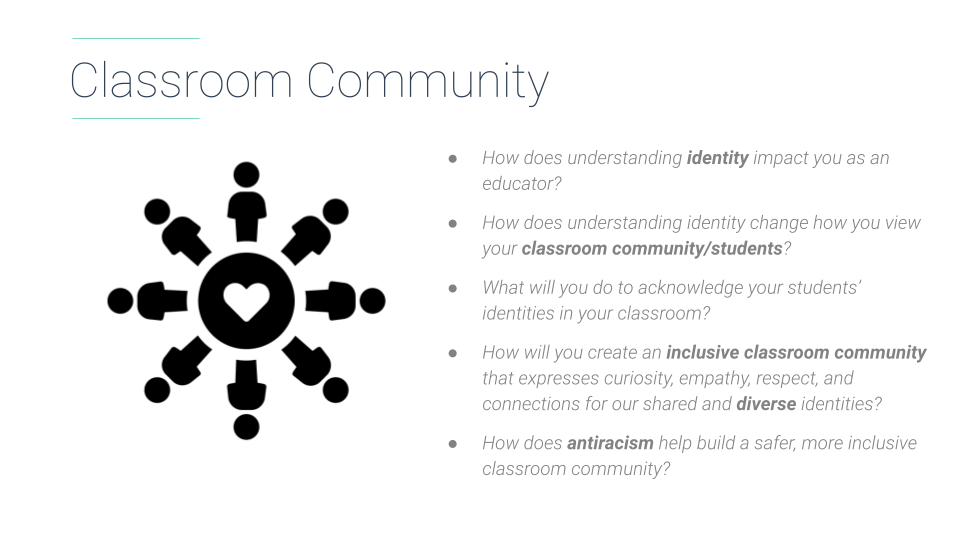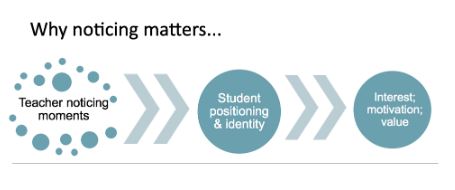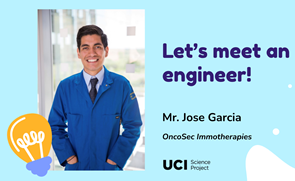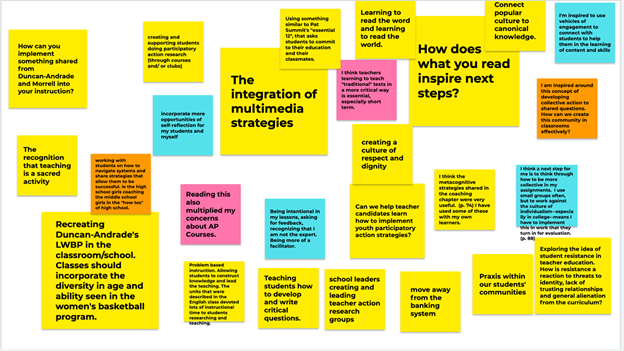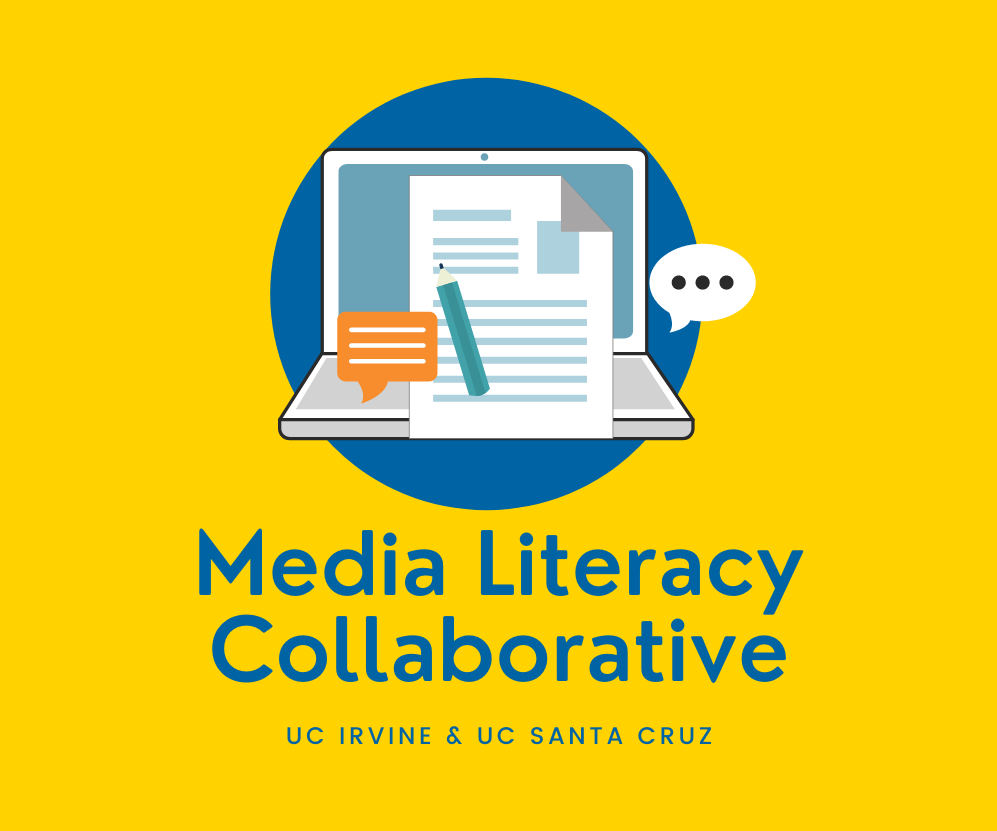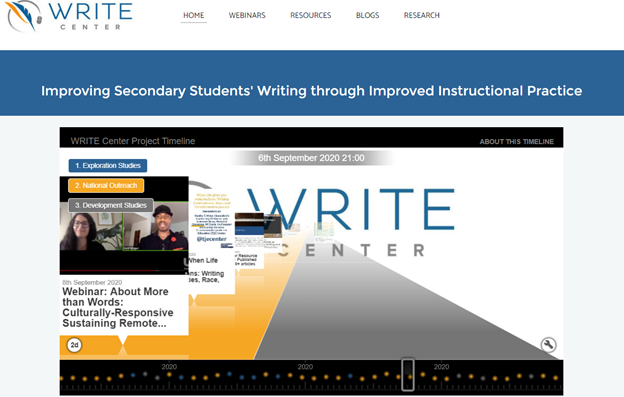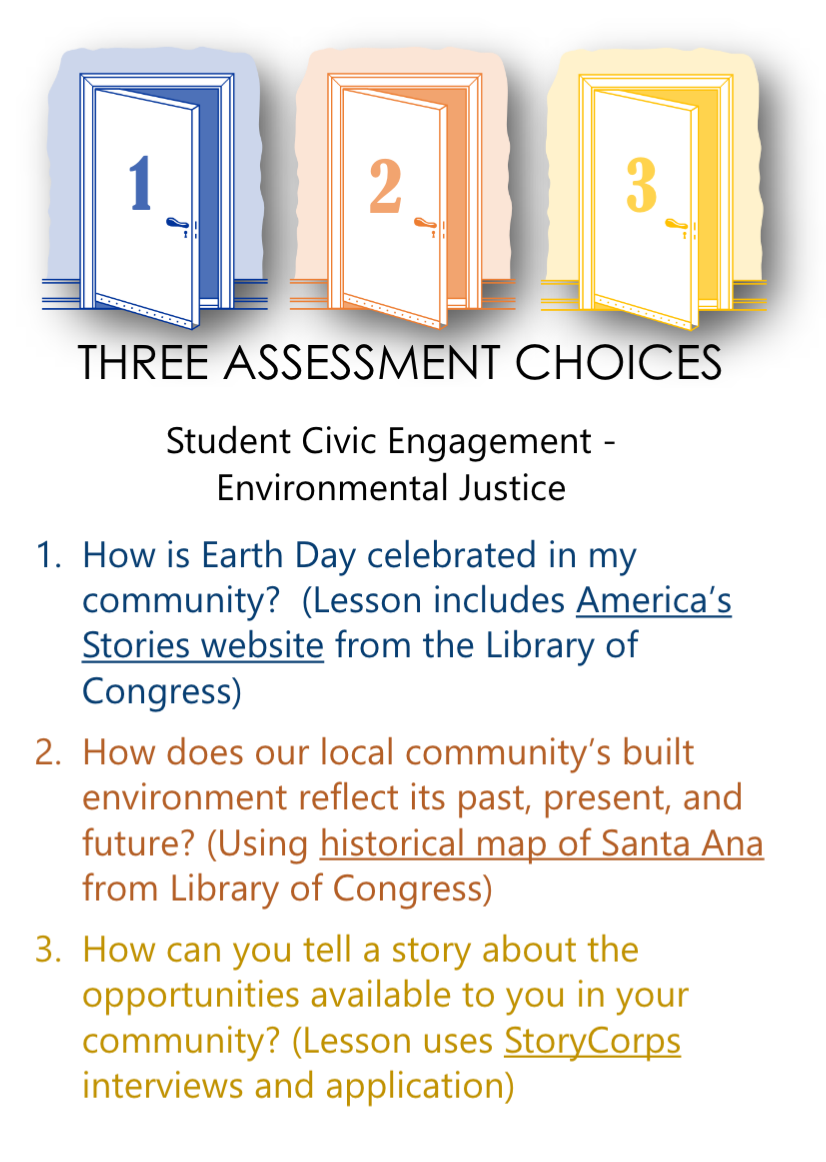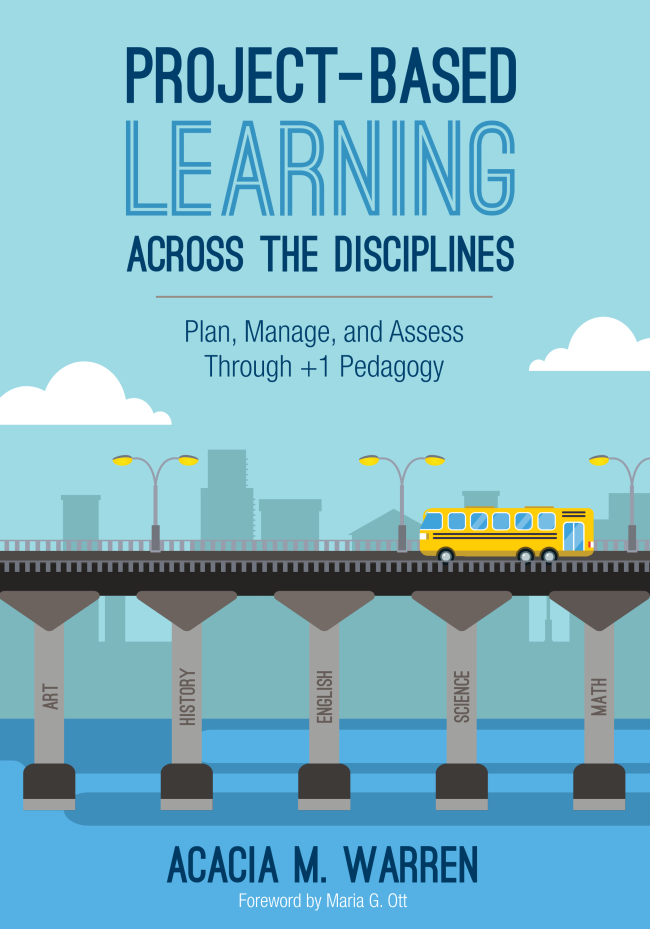Ethnic Studies Lessons in Solidarity: Students Share Stories of Indigenous Resistance
by Mariana Ramirez
November 20, 2023
During the summer of 2023 the UCI History Project held several Ethnic Studies professional development programs for teachers throughout the southern California region. These sessions all focused on learning from and with local community experts and scholars with the goal of having teacher participants develop Ethnic Studies curriculum. One of those professional learning sessions was titled, “Relational Stories of Solidarity in Southern California.” Thus, our teacher selection was centered on teachers who grew up in Orange County or teachers who currently teach in Orange County. For this session on solidarity, teachers who applied to this series and were accepted to the program gathered for two days at the Orange County and Southeast Asian Archive at UCI, where they were guided by Dr. Krystall Tribbett, lead curator for Orange County Regional History, to explore local primary sources from documents, newspapers, posters, photographs.
Read More
A Case for Media Literacy in Every Classroom
by Nicole Gilbertson
November 20, 2023
Opportunities for students to engage in media literacy to critically analyze and engage in the creation of media content is an essential skill for informed and responsible civic engagement that students can learn in each of their courses. A recent report by the National Academy of Education, Educating for Civic Reasoning and Discourse, recommends, “Learning to engage in civic reasoning and discourse should explicitly include strategies to help students gather, analyze, and thoughtfully circulate information in digital and other media, including identifying and combating misinformation (Lee et, al. 2021).” Indeed, California has passed legislation, Assembly Bill 873, to incorporate media literacy, defined as “the ability to access, analyze, evaluate, and use media and information” into California’s Frameworks initiating with English in 2024, and math, science, and history-social science when they are next revised.
Read More
What Teachers Need to Know Now about ChatGPT, Bard, and the Pipeline of AI Text Generating Tools
by Tamara Tate
March 2023
Since its free public release in November 2022, ChatGPT has made national news and been all over social media. When my 80-year-old mother started mentioning ChatGPT to me, I figured it had truly gone mainstream. In this article, I will provide some general background about ChatGPT and similar AI tools that generate text and walk you through some thoughts about the best pedagogy and practices so far for teachers and students when writing with these tools.
Read More
Implementing the Ethnic Studies Graduation Requirement: A Case Study
by Cindy Mata and Lynn Schaulis
November 21, 2022
It has been over a year since Assembly Bill 101 was passed, making Ethnic Studies a graduation requirement in California public and charter schools. As districts work to ensure they meet this requirement for California’s graduating class of 2029-2030, we offer some insights as to what has been helpful in the development of Norwalk-La Mirada Unified School District’s (NLMUSD) Ethnic Studies program.
Read More
National Board Incentive Program
by Susan Nisonger Olsen
October 14, 2022
Commencing July 1, 2021, the NBPTS Certification Incentive Program provides a $25,000 incentive award for California National Board-Certified Teachers (NBCTs) who teach in high-priority schools. This award is “granted to the extent that funds have been appropriated for this purpose in the annual Budget Act.” Awards grants to school districts for the purpose of providing incentives to teachers who have attained certification from the National Board for Professional Teaching Standards (NBPTS) and agree to teach at a high-priority school for at least five years. Additionally, any teacher who initiates the process of pursuing a certification from NBPTS when teaching at a high-priority school is eligible to receive a candidate subsidy to cover the costs of seeking certification.
Read More
Summit Will Empower Educators to Combat Antisemitism and Hate in Schools
by Lisa Armony
July 20, 2022
Antisemitism, the hatred of, and bigotry toward, Jews, is at historically high levels in Orange County, across the U.S., and around the world. Sadly, this trend is mirrored in our nation’s schools. The Anti-Defamation League’s (ADL) 2021 Audit of Antisemitic Incidents reported 331 antisemitic incidents in K-12 schools nationwide last year, a 93 percent increase from 2020. Because most hate incidents go unreported, the actual number of incidents is certainly much higher.
At the same time, hate targeting other marginalized communities is likewise rising. The multifold increase in hate acts targeting the Asian American Pacific Islander (AAPI) community following the outbreak of the COVID-19 pandemic is just one of many disturbing examples, but escalating levels of hate targeting Black Americans, the LGBTQ+ community, Muslims, Sikhs, and others also gives us cause for alarm.
Read More
Teaching for Justice
by Tuyen Tran
March 15, 2022
Not all anniversaries are happy occasions. It is a solemn remembrance that this week marks the one-year anniversary of the Atlanta spa shootings, where a gunman killed eight people, six of whom are of Asian descent. Also devastating are the over 10,000 reported incidents (and counting) of anti-Asian hate since the start of the pandemic. Statistical data belies the names and personal histories of the victims. The senseless violence met by Soon Chung Park, Hyun Jung Grant, Suncha Kim, Yong Yue, Delaina Ashley Yaun, Paul Andre Michels, Xiaojie Tan, Daoyou Feng, Yao Pan Ma, Michelle Alyssa Go, and Hoa Thi Nguyen could have been any of us fitting a racialized profile. Anti-Asian hate is indiscriminate in its discrimination.
Read More
Trauma-Informed Practice During the Ongoing Pandemic
by Laura Belfiglio Gold
November 22, 2021
Trauma. It is a ubiquitous term applied daily to the 21-22 school year…as it was during the 20-21 school year. Trauma. It is impacting our students, our families, our colleagues.
But what is trauma?
Trauma can be thought of as the three Es or a result of an 1) event, or series of events or circumstances that is 2) experienced differently by each individual, e.g. what is traumatic to one person can be tolerated by another. Finally, trauma 3) effects each of us differently and can result in emotion, academic, physical, or spiritual impact. Sometimes trauma can be easily recognized, but just as often, goes undetected and undiagnosed.
How can we address trauma in our classrooms, particularly if we don’t always know if it’s there?
Read More
Building an Antiracist Classroom
by Stacy Yung and Virginia Nguyen
November 22, 2021
During the fall of 2021, Educate to Empower hosted the Building an Antiracist Classroom Community workshop series with the goal of building community in the classroom and with fellow educators. In the workshop series, we, Virginia and Stacy, share the ways in which they build and foster their antiracist classroom communities. Together, with other fellow antiracist educators, the workshop series modeled, explored, guided, reflected, and provided resources and strategies for creating a classroom in which students feel welcomed and find a place of belonging. Our workshops are grounded in culturally sustaining pedagogies that combine philosophies, teaching strategies, and lessons from past and present. In the following, we provide an overview of the series and information on upcoming events.
Read More
Routines for Professional Collaboration
by Robyn Lee-Giuseffi and Linda Palomino
November 22, 2021
Imagine you are a seventh grade student and you arrive at your favorite class. You are greeted warmly by the teacher, you take your seat, and follow the class routine to choose a warm-up question and get ready to share your ideas with your assigned partner. You use the partner talk structures your teacher has taught you, making sure to make eye contact, take turns, paraphrase, and ask questions. You know that you and your partner have 4 minutes to collaborate before the teacher will call on a non-volunteer. You also know that if you are called on and you don’t know the answer, your teacher will give you more time to talk to your partner and then come back to you. Imagine how it feels. Why is this your favorite class? The expectations were established and you were able to focus on purposeful interaction and learning within the structure of the opening routine. You know exactly how to begin so that the time feels purposeful and you were taught skills for each part of the routine.
Read More
Teacher Noticing: What is it and why does it matter for teaching?
by Elizabeth van Es
June 2, 2021
Enter most classrooms and you will observe a lot taking place — a teacher presenting a lesson or leading a discussion, students huddled together working collaboratively in a group, students and teachers working through and talking about the task at hand. You might also see students getting out of their seats and moving about the classroom; some students following along with the task while others are talking to their neighbors; and some students rifling through their backpacks and others simply daydreaming.
Classrooms are busy places with a lot of activity. Teachers have a lot to focus on at any given moment – they must choose what they will focus on and ignore and how to interpret what they see to move students’ learning forwards. Research on teaching defines this attentional work of teaching as teacher noticing.
Read More
Everyone is a Scientist and Engineer
by Monica Maynard, Allison Desfor, Marianna O’Brien
Edited by Dr. Kelley Le
May 20, 2021
The Young Engineers & Scientists (YES) Program seeks to introduce elementary school aged children from underrepresented groups to the wonders of science and engineering. Through the YES Program, students are inspired and motivated by highly qualified teachers in partnership with local nonprofits (such as Aquarium of the Pacific, Amigos de Bolsa Chica, and The Ocean Agency), as well as professionals from both UCI and private industry in science and engineering fields as guest speakers. These young students are immersed in activities that focus on critical thinking, collaboration and creativity, and environmental literacy. As students experience the program, they are positioned as capable and knowledgeable scientists and engineers where their bright ideas are valued, heard, and elevated. Students are provided the opportunity to exercise flexibility and agency to generate ideas for solutions to these challenges.
Read More
Centering Student Voices: Jeff Duncan-Andrade and Critical Pedagogy
by Nicole Gilbertson
March 23, 2021
The events of 2020 have made strikingly visible that schools will need to rethink what currently is and should be the objects of student learning and how they organize students to learn in order to address the gross inequities that plague our schools.
To begin to interrogate these issues, the UCI Teacher Academy has brought educators together in a variety of contexts to listen and learn from each others’ experiences in order to encourage one another to transform schools and classrooms so all students can thrive.
Last November, we had the great fortune to host Dr. Jeff Duncan-Andrade, Professor of Latina/o Studies and Race and Resistance Studies at San Francisco State University, in a “Talk with Teachers” where he shared his expertise fostering humanizing pedagogical practices in the classroom. Dr. Duncan-Andrade launched us into a discussion of the importance of caring for our students, centering student voices, and reexamining the purpose of public schools.
Read More
Why Should We Reimagine Teaching and Classrooms for Post-Pandemic Education?
by Doron Zinger
March 23, 2021
Last summer, which seems much longer than nine months ago, teachers across the country sacrificed countless hours and days trying to prepare for the inevitable crisis that they would face as schools opened in the fall. Teachers knew that schooling would look very different, but uncertainties abounded. Teachers often faced challenges alone in the face of a lack of leadership and direction. In the fall, teachers entered classrooms with little preparation for remote, hybrid, or socially distanced instruction, having to develop new pedagogies, learn to use new technology tools, and dealing with new and growing student trauma. In Southern California these traumas impacted Black and Latinx students disproportionately, harming students who were already marginalized. Most teachers faced working from home, as their students had to navigate school from home as well.
Read More
Media Literacy in the Classroom
by Joseph Aubele
March 23, 2021
Media literacy has a wide range of purposes and goals that researchers and educators can work towards to support students to engage in the essential skills for our democratic society. These goals can include: recognizing advertisements versus articles; identifying credible information and sources, among many more. Importantly, many (if not all) of these goals require use of many different skills and high use of cognitive resources. When considering the wide range of goals and the complexity of achieving these goals, it can present a daunting task for researchers and educators. While there is currently high-quality research being conducted which has shown the field numerous strategies to assist students in being smart digital consumers, a concern we have heard from educators is, how do I get my students to consistently do these things? This is a crucial question because if people know what to do, but they do not actually do it then the skill in question really does not serve its utility. Teachers we have worked with have found success in more consistent use by implementing regular skill-building assignments, such as “media literacy Fridays”, where students bring in stories and events to evaluate. Teachers also integrate media literacy skills to current content by evaluating information encountered in class with a different perspective. Ultimately, this matter of utility has and continues to be an important question for education researchers since research just for research sake often does not consider the utility of the work. Importantly, there are groups who work closely with educators, create high quality materials, and do consider utility in their work.
Read More
Teaching for the 1619 Project in California
by Nicole Gilbertson
November 12, 2020
The Black Lives Matter protests this summer underscore the responsibility we as teachers have to provide students with opportunities to learn about the history of racism in our country. While discussions of race, particularly in this time of political polarization can be challenging, the California Department of Education’s initiative, “Education to End Hate,” passed in September, explicitly invites teachers to engage in these conversations in our classrooms. At the center of this initiative is the relevance of history instruction. State Superintendent Tony Thurmond asserts, “It’s time to double down on our efforts to combat all forms of hate, bias, and bigotry. By digging deeper into the complexities of our diverse and difficult histories—not denying or ignoring them—I believe education can provide the pathway to healing, understanding, and racial and social justice.” As we provide learning opportunities for our students to have the knowledge they need to be changemakers in our society, our classrooms should be places where young people consider, discuss, and analyze the history of racism in our country. To aid in that effort, teachers will find many relevant and high-quality lessons from the California History-Social Science Project that offer teachers ways to make the history of African Americans in the US an important component of their curriculum.
Read More
Decolonizing Science Teacher Preparation
by Doron Zinger
November 7, 2020
My understanding of decolonizing teaching in math and science for K-12 is evolving and likely closer to its infancy than maturity. I think of decolonizing work as a process and an instructional approach rather than a skill or set of tools, though these are useful to guide decision making. I also need to acknowledge that I am a cishet white male and the position of privilege that I hold, as well as acknowledging how I have benefited from colonization, and cause/d harm with my own practice. It’s important to define what decolonizing is to begin with and the work of education researcher and indigenous scholar Eve Tuck grounds some of this for me. I understand decolonizing as an approach to combat settler colonialism, the move of valorizing white western, mostly male world views. This manifests itself in two main ways, cultural erasure, and cultural appropriation, both of these are underpinned by a combination of historicizing (ie. talking about native Americans in the past tense) as well as historical erasure (ie. ignoring contributions by some, and ignoring crimes and violence by others).
With that premise, the work of decolonizing math and science teacher preparation requires multiple paths that address settler colonialism: Acknowledging settler colonialism and white western dominance in science.
Read More
Centering Equity through Responsive, Transformative, Healing Literacy Instruction
by Jenell Krishnan
October 31, 2020
During September 2020, the National WRITE Center (Writing Research to Improve Teaching and Evaluation) hosted a webinar series that centered equity through responsive, transformative healing literacy instruction. Our goal was to create spaces for educators, teacher leaders, and researchers to connect and learn with nationally-recognized experts. In what follows, we provide an overview of the series, how to gain access to webinar materials, and information on upcoming events.
On September 14th, the series began with “About More than Words: Culturally Responsive-Sustaining Remote Writing Instruction,” facilitated by Dr. David Kirkland, the Vice Dean of Equity, Belonging, and Community Action at New York University. Dr. Kirkland engaged participants in a conversation on what it means to teach writing in the time of global pandemic, social unrest, and economic uncertainty. He offered guidelines to promote culturally responsive-sustaining teaching practices in technology-enhanced settings and supported a crucial conversation about how we can best serve our diverse populations during and beyond the COVID crisis. When asked “What do you intend to put into action from this webinar?, participants shared the following…
Read More
Using Assessments to Engage Students
by Nicole Gilbertson
August 24, 2020
This article originally appeared in the California History-Social Science Project magazine, The Source. View the PDF here.
Remote teaching brought many challenges for teachers to meet the needs of their students, and teachers had many innovations to meet these needs. In my conversations with teachers, the most common questions and concerns were, How do I keep students engaged in our online learning context? and, How can I assess my students remotely? One solution to these two challenges is choice board assessments, a strategy shared with me by two teacher leaders from La Paz Intermediate, Tammy Black and Trish Jorquiera. Choice boards allowed for student differentiation as they grappled with a standard distance learning curriculum.
A choice board is an assessment activity that provides students with options in the type of assignment that they will complete to demonstrate her learning, this allows for differentiation in student output. In this way, the teacher effectively communicates to students that there are a variety of ways that students can express their learning and, additionally, this approach supports student engagement in the learning process. For example, at the start of the year, an elementary teacher integrating environmental literacy into her classroom may want to assess students learning around the question, In what ways have students been civically engaged in environmental justice in the past and present?
Read More
Teacher Academy Hosts Dialogue: Navigating Remote Instruction in K12 Classrooms
by Elizabeth van Es
May 12, 2020
On April 24th, the UCI Teacher Academy hosted two virtual gatherings to bring teachers and school leaders together to discuss how they have navigated moving to remote instruction in an effort to “flatten the curve” during the coronavirus pandemic. Our goal was to create a space to hear the challenges districts and teachers experienced in the first month of remote instruction and to share with each other creative strategies they have developed to respond to these challenges. We strongly believe that district leaders and teachers have local expertise and that if space is created to share solutions, they can learn new strategies and ideas from one another and generate new knowledge and practice together. At the same time, we understand that teachers and districts need support using new technologies to achieve their learning goals and re-conceptualizing instruction in a remote context. By bringing this group together, we were able to identify topics for professional learning that we plan to offer as we all prepare for some form of remote instruction in the next academic year.
Teachers and district leaders converged around a core challenge they were facing – connecting with students. This issue took on various forms. At the district level, connecting with students involved ensuring that they have the equipment to connect to the school remotely – both having computers and having stable internet connections. At the time of our meeting, in some districts, as many as 40% of students did not have internet access. We were encouraged by the actions many district leaders were taking to equip students with what they needed. For some, this involved connecting with local cellular providers requesting donations for mobile hotspots. For others, it meant identifying students who needed computers and getting them in students’ hands. And in other districts, this meant setting up regular times for families and students to pick up materials at their local school site to ensure that their students continued to have access to the content.
Read More
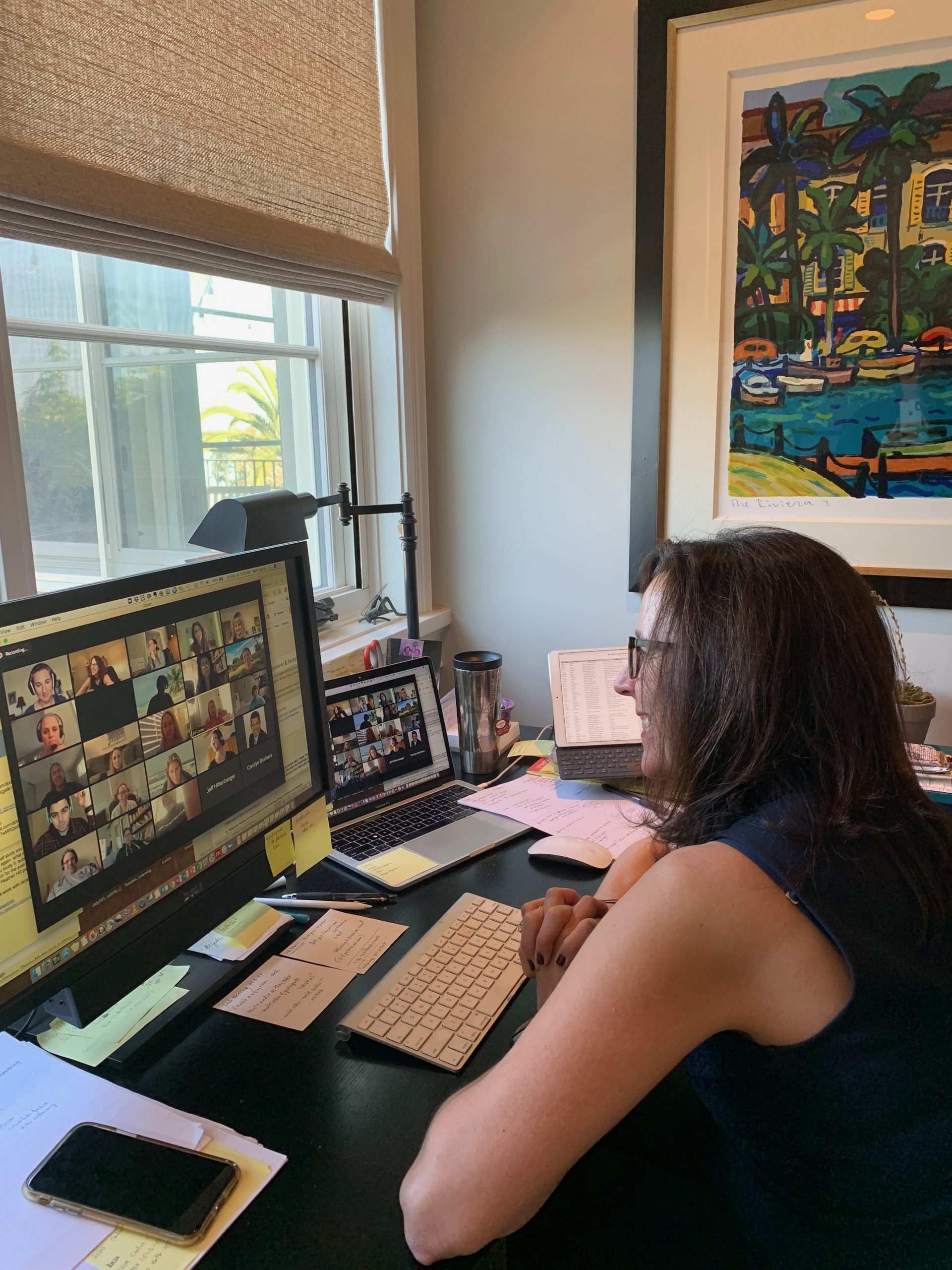
Math Instruction & Virtual Teaching: Does Face-to-Face Instruction Matter?
by Karajean Hyde
May 8, 2020
For a video presentation on how to most effectively use Pear Deck, featuring Karajean Hyde, please click here.
I’ve just spent the past few weeks in non-stop webinars and Zoom meetings, reading and begging for help to learn how to use the following: Zoom with chat features, Zoom with breakout rooms, Pear Deck, Yuja, Screencastify, Interactive Google slides, Google forms with QR codes, and countless other technologies. Why? So I can teach remotely, students can still interact, we can measure learning, and we can provide appropriate support. Oh, and while doing all of this, I’m also homeschooling my own four children. No problem, right? If and when we each can perfect our virtual instruction, will it yield the same results as face-to-face instruction?
One of the reasons we have Common Core math standards is that the evidence was clear that over 80% of everything learned in pre-common core, K–12 math classrooms in the US could be done by a computer; the standards represented a shift away from merely copying steps as a computer does and towards problem solving and rigorous conceptual learning. Where does that leave us, now, when distance learning is dependent upon computers and zoom calls? Can we still expect Common Core level rigor and understanding? When we end our massive shut-down and the dust settles, it will reveal something about the value of teachers and administrators in real classrooms and schools.
Read More
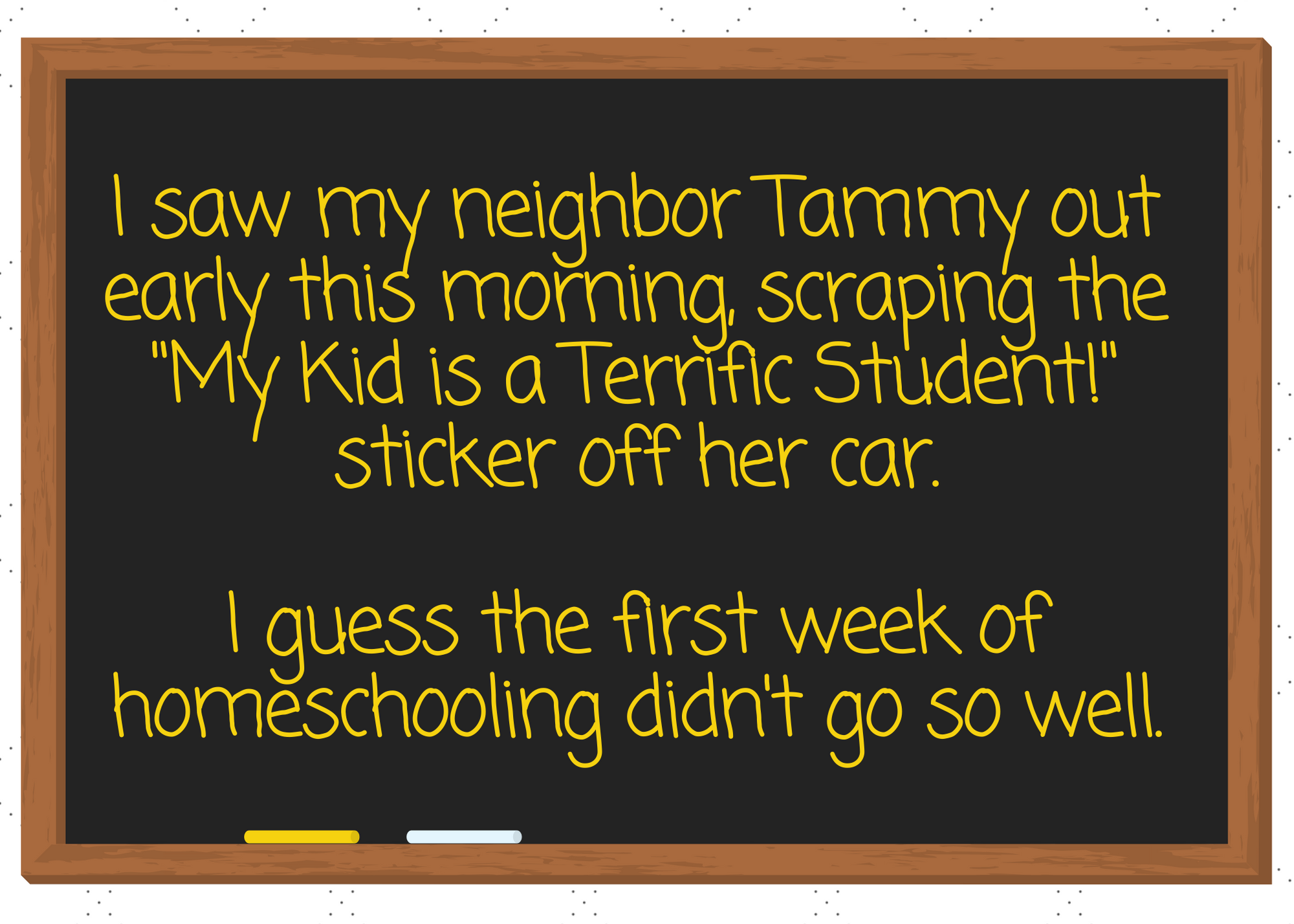
Using Picture Books to Learn History
by Nicole Gilbertson
May 4, 2020
Last spring, 40 elementary teachers gathered at UCI to consider how we can promote students’ historical inquiry in the elementary classroom using picture books. While face-to-face workshops seem like long-ago occurrences, the connection and lessons learned are just as relevant during our remote teaching context when reading to our children remains an important way to promote literacy at home.
Our goal with the workshop was to share culturally-relevant books that put children’s agency as changemakers at the center of the story. Each of the books that my colleague, Lisa Hutton, and I shared with the teachers was accompanied by inquiry questions and relevant informational sources aligned to California’s Framework for History-Social Science. Each of the books and corresponding sources allows teachers to deepen student learning through an inquiry-based approach. The questions promote students’ historical thinking skills such as comparing today to the past, considering who makes up our community, and learning about how humans rely on our natural environment. Teachers can access the book recommendations, inquiry sets, and pedagogical strategies at tinyurl.com/CLIC4change.
Read More
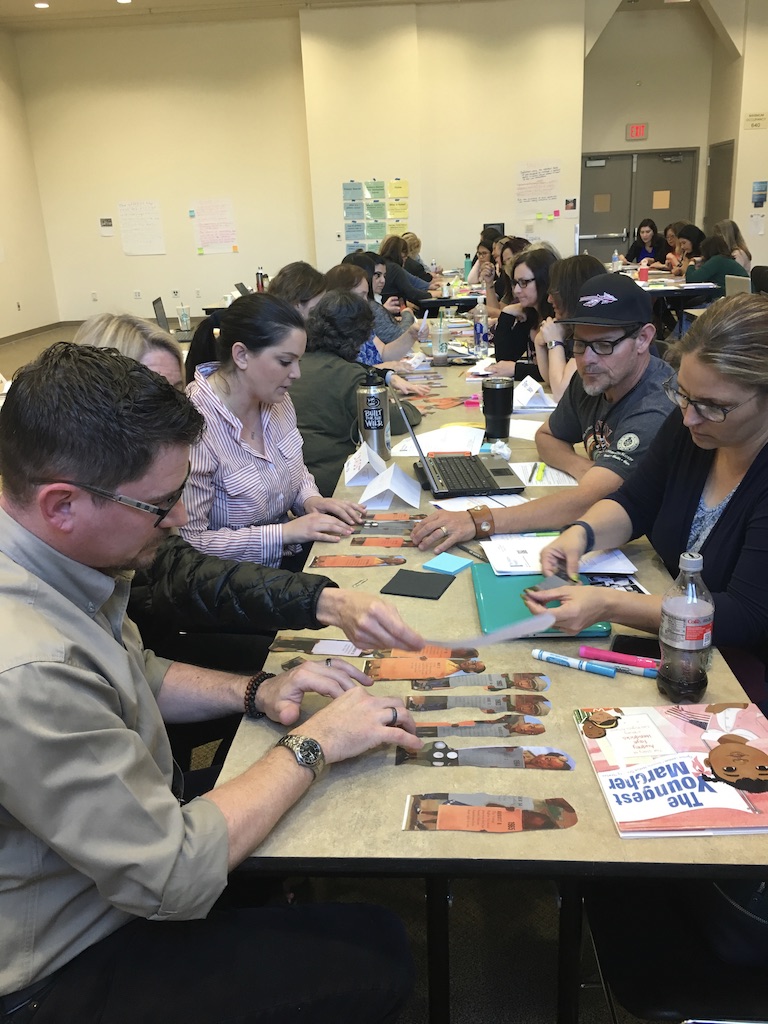
Optimizing the Use of Video for Online Teacher Education
by Rossella Santagata
March 30, 2020

The UCI School of Education’s Center for Research on Teacher Development and Professional Practice (CRT) fosters collaborations among faculty, students, and practitioners on projects focused on a variety of aspects of teacher development and learning and on the study of teaching and teacher professional practice and of the systems in which these are embedded (including school and district leadership).
To assist K12 teacher educators in the transition to online learning, the CRT assembled a helpful guide to optimize the use of video for online teacher education.
Video has a variety of features that make it a promising tool to mediate teacher learning in online environments:
- It captures the authenticity of classroom practice, bringing to life the work of teaching for careful study;
- It enables teacher educators to slow down and zoom in the work of teaching, thereby helping novices see the concrete ways that teachers enact particular teaching moves and the consequences for student’ opportunities to learn;
- It affords novices the opportunity to see the detailed ways that classroom life unfolds, what is often difficult to see in actual classroom settings;
- It can capture images of possibilities in teaching. It is well documented that field placements do not typically represent the image of teaching advocated by recent policy and reform initiatives. With video, teacher educators can provide novices with representations of ambitious instructional practice.
- It captures and represents the work of teaching in different grain sizes – small group interactions, whole class discussions, an entire lesson, or a collection of lessons over the course of a year with each of these representations providing teachers opportunities to see the multiple layers of the work of teaching.
Read More
Creating and Orchestrating Online Instruction
by Doron Zinger
March 16, 2020
To view the following article in an easy-to-print document, please click here.

Beginning of class, setting learning goals, getting to know, building community:
- Create a slide presentation, introduce yourself in a single slide and ask students to create a single slide introducing themselves to class.
- Create a form surveying students about prior knowledge, expectations of the class, and individual interests in areas related to the class (consider using this info to create small groups and flexible assignments like research papers).
- Create a brief 2-3 minute video introducing yourself.
- Create a brief 2-3 minute video going over the major goals/objectives of the class.
Read More
Fostering Educator Resilience: Is it time to think about the “whole” educator so everyone thrives?
by Robyn Lee-Giuseffi and Linda Palomino
February 27, 2020
We’re all in this together. And together, we thrive.
It wouldn’t be a stretch to take that familiar health care slogan and make it a bumper sticker for educators because it captures a core truth about schools. The well-being of a school can be measured by the well-being of its individual members along with the cohesiveness and purposefulness of the collective.
We occupy the same space, pass through the same office, use the same copiers, maybe avoid the same staff lounge. But it doesn’t always feel as if we are in anything together. And it certainly doesn’t seem as if everyone is thriving. Schools are typically called “communities” and sometimes even “families”, and yet many teachers feel depleted and isolated as they manage the demands of teaching a room of individuals, each with individual academic and emotional needs.
The California Reading and Literature Project is a teacher professional learning network with the mission of promoting and leveraging the collective knowledge of teacher-leaders, researchers, and scholars in the field of literacy for the benefit of California students. We’ve had the privilege to be part of the Project for more than a decade and deeply value this experience because of the network of dedicated teachers who have taught us so much. There is certainly a lot to learn and understand about literacy if we are going to ensure our students are prepared for the literacy demands of life!
Read More

Project-Based Learning for Any Topic in Any Discipline: A New Vision for Teaching and Learning
by Acacia Warren
February 19, 2020
Think about your K-12 schooling experience. How often did you engage in research and inquiry around a topic that you were truly excited about? As early as kindergarten, I was fond of sports, Michelangelo, traveling, holidays, food and different cultures. I distinctly remember traveling during the summer time and watching the Warriors, Oakland A’s and Raider games with my family. However, I rarely got the opportunity to study topics in school that were relevant and interesting to me. Once I had the means to inspire change in pedagogical practices, it become my passion to do so. I turned my dissertation on project-based learning (PBL) into a published book. I wanted to equip educators with a turnkey curriculum that accounts for planning, managing and assessing PBL. My intentions were to create an interdisciplinary PBL model that motivates students, amplifies student potential and transforms instruction. The ultimate goal? Push the boundaries of what’s possible for teaching and learning.
Read More
Lesson Plan: Syrian Civil War
by UCI History Project
February 19, 2020
This lesson plan from the UCI History Project provides a framework for studying the Syrian Civil War. Topics include: Syrian Civil War Participants, Consequences of War, Plans for Syrian Refugees, and an analysis of Alan Gratz’s book, Refugee.
View Lesson Plan (PDF)

UCI Alum, Harvard Professor Shares Research on Southern California’s Undocumented Youth
by Virginia Panish
February 19, 2020
Dr. Roberto Gonzales, Professor of Education at Harvard University, UCI alum, and author of Lives in Limbo: Undocumented and Coming of Age in America, delivered the first lecture in the UCI School of Education’s Equity and Inclusion Speaker series on September 25, 2019. The impetus for this event was a shared reading assigned to the incoming 2019-20 Master of Arts in Teaching (MAT) and CalTeach candidates. Program leadership wanted to forefront our commitment to equity and social justice as the new pre-service teachers entered the program, and Dr. Gonzales’s research exploring the lives of undocumented youth in southern California was a powerful way to communicate this commitment. In his lecture, “Lives Still in Limbo: (Un)DACAmented and Navigating Uncertain Futures”, Dr. Gonzales explored the capacity for schooling to both contribute to a sense of belonging for undocumented youth and foster profound alienation.
Read More
View Lecture
VIDEO: Supporting Teacher Candidates to Value Diverse Learners
By Susan Toma-Berge
December 19, 2019
Susan Toma-Berge, Coordinator of the Multiple Subject Teacher Credential Program at UCI, presents at a UCI Teacher Academy breakfast on December 19, 2019.
The title of Toma-Berge’s lecture is “Supporting Teacher Candidates to Value Diverse Learners.”
VIDEO: Teacher Noticing for Equity
By Elizabeth van Es
December 19, 2019
Elizabeth van Es, Co-Director of the UCI Teacher Academy and Associate Dean and Associate Professor at the UCI School of Education, presents at a UCI Teacher Academy Breakfast on December 19, 2019.
The topic of van Es’s talk: “Teacher Noticing for Equity: What is It and Why Does It Matter for Creating Positive Classroom Climates?”
VIDEO: National Teacher Appreciation Day 2019
By UCI Teacher Academy
May 7, 2019
The UCI Teacher Academy presents National Teacher Appreciation Day 2019, featuring keynote speaker Deborah Loewenberg Ball.
Dr. Ball, the William H. Payne Collegiate Professor of Education at the University of Michigan, delivered a lecture titled “The Power of Teaching.”
National Teacher Appreciation Day is an opportunity for the UCI School of Education and the UCI Teacher Academy to recognize local teachers in their efforts in shaping future generations. Local educators are able to connect with colleagues and learn practical skills from a keynote speaker.


